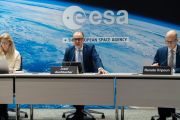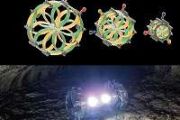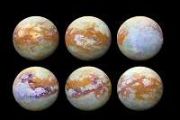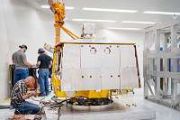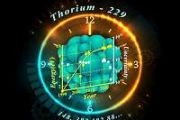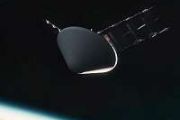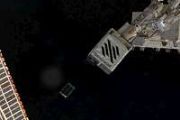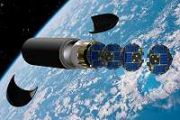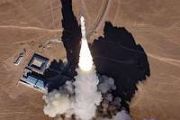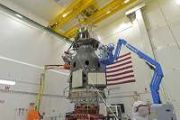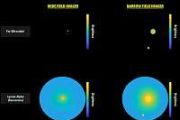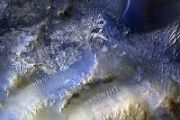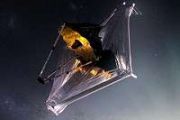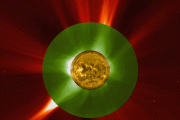
Copernical Team
UAH study sheds light on mystery of why the solar corona is super hot
 In a new study published in the The Astrophysical Journal, a researcher from The University of Alabama in Huntsville (UAH), a part of the University of Alabama System, explores critical aspects of a phenomenon called kinetic Alfven waves (KAWs) to provide fresh insights into an age-old heliophysics mystery. Syed Ayaz, a graduate research assistant at the UAH Center for Space Plasma and Aeronomic
In a new study published in the The Astrophysical Journal, a researcher from The University of Alabama in Huntsville (UAH), a part of the University of Alabama System, explores critical aspects of a phenomenon called kinetic Alfven waves (KAWs) to provide fresh insights into an age-old heliophysics mystery. Syed Ayaz, a graduate research assistant at the UAH Center for Space Plasma and Aeronomic Enhanced communication for Lunar Gateway through electric field testing
 Engineers at NASA's Johnson Space Center have initiated electric field testing on communications hardware designed for the Gateway, the pioneering space station set to orbit the Moon.
Gateway will serve as an orbiting lab for deep space science and as a staging point for lunar exploration. This project will enable NASA and its international partners to maintain a human presence on and arou
Engineers at NASA's Johnson Space Center have initiated electric field testing on communications hardware designed for the Gateway, the pioneering space station set to orbit the Moon.
Gateway will serve as an orbiting lab for deep space science and as a staging point for lunar exploration. This project will enable NASA and its international partners to maintain a human presence on and arou Lunar soil sample from Chang'e-5 showcased in Bangkok
 A rare lunar soil sample from China's Chang'e-5 mission drew large crowds in Bangkok.
In collaboration with the National Astronomical Research Institute of Thailand (NARIT) and the China National Space Administration (CNSA), the lunar sample was a key feature at the Sci Power for Future Thailand Fair, which concluded on Sunday.
Displayed in a rotating crystal sphere, the 75-milligram
A rare lunar soil sample from China's Chang'e-5 mission drew large crowds in Bangkok.
In collaboration with the National Astronomical Research Institute of Thailand (NARIT) and the China National Space Administration (CNSA), the lunar sample was a key feature at the Sci Power for Future Thailand Fair, which concluded on Sunday.
Displayed in a rotating crystal sphere, the 75-milligram GMV advances Lunar rover navigation with FASTNAV project
 The Multi-Range Navigation for Fast Moon Rovers project, known as FASTNAV, is spearheading the development of advanced navigation solutions for the next generation of lunar exploration rovers. This initiative, led by GMV's UK branch and supported by the European Space Agency (ESA) under the General Technology Support Programme (GSTP), aims to enhance rover capabilities for longer distances and h
The Multi-Range Navigation for Fast Moon Rovers project, known as FASTNAV, is spearheading the development of advanced navigation solutions for the next generation of lunar exploration rovers. This initiative, led by GMV's UK branch and supported by the European Space Agency (ESA) under the General Technology Support Programme (GSTP), aims to enhance rover capabilities for longer distances and h NASA nearing completion of NISAR antenna reflector work
 NASA is close to completing the radar antenna reflector for the NISAR (NASA-ISRO Synthetic Aperture Radar) satellite in California, with ongoing tests to ensure proper deployment post-launch. The drum-shaped reflector, approximately 39 feet (12 meters) in diameter, is a key NASA contribution to this collaborative mission with the Indian Space Research Organisation (ISRO). This reflector will tra
NASA is close to completing the radar antenna reflector for the NISAR (NASA-ISRO Synthetic Aperture Radar) satellite in California, with ongoing tests to ensure proper deployment post-launch. The drum-shaped reflector, approximately 39 feet (12 meters) in diameter, is a key NASA contribution to this collaborative mission with the Indian Space Research Organisation (ISRO). This reflector will tra NASA and JAXA exchange laser signals between SLIM lander and LRO in lunar orbit
 NASA's Lunar Reconnaissance Orbiter (LRO) has successfully transmitted a laser pulse to a small retroreflector on JAXA's (Japan Aerospace Exploration Agency) SLIM lander on the Moon, receiving a return signal on two occasions.
During two orbits on May 24, 2024, LRO passed 44 miles above the SLIM (Smart Lander for Investigating Moon) and used its laser altimeter instrument to send signals t
NASA's Lunar Reconnaissance Orbiter (LRO) has successfully transmitted a laser pulse to a small retroreflector on JAXA's (Japan Aerospace Exploration Agency) SLIM lander on the Moon, receiving a return signal on two occasions.
During two orbits on May 24, 2024, LRO passed 44 miles above the SLIM (Smart Lander for Investigating Moon) and used its laser altimeter instrument to send signals t Rocket Lab readies twin spacecraft for NASA Mars mission
 Rocket Lab USA, Inc. (Nasdaq: RKLB) ("Rocket Lab" or "the Company"), a global leader in launch services and space systems, has finalized the integration and testing of two spacecraft that will soon journey to Mars.
Rocket Lab constructed the twin spacecraft for the University of California Berkeley's Space Science Laboratory and NASA to support the Escape and Plasma Acceleration and Dynami
Rocket Lab USA, Inc. (Nasdaq: RKLB) ("Rocket Lab" or "the Company"), a global leader in launch services and space systems, has finalized the integration and testing of two spacecraft that will soon journey to Mars.
Rocket Lab constructed the twin spacecraft for the University of California Berkeley's Space Science Laboratory and NASA to support the Escape and Plasma Acceleration and Dynami Starliner completes docked hot fire test
 The Starliner team successfully conducted a docked hot fire test of the spacecraft's Reaction Control System (RCS) thrusters on Saturday afternoon. This test included monitoring the helium system and collecting additional data for the Crew Flight Test's return to Earth.
Under the direction of Starliner flight director Chloe Mehring and with Boeing engineers on console monitoring, flight co
The Starliner team successfully conducted a docked hot fire test of the spacecraft's Reaction Control System (RCS) thrusters on Saturday afternoon. This test included monitoring the helium system and collecting additional data for the Crew Flight Test's return to Earth.
Under the direction of Starliner flight director Chloe Mehring and with Boeing engineers on console monitoring, flight co ULA plans to launch Atlas 5 from Florida for Space Force
 United Launch Alliance plans to launch an Atlas 5 rocket's 58th and final national security mission on Tuesday from Cape Canaveral Space Force Station in Florida.
Liftoff is scheduled for 6:45 a.m. EDT from Launch Complex 41, with a three-hour window. There is a 55% chance of rain Tuesday, according to Accuweather.com.
The launch will be streamed on ULA's website.
The top-
United Launch Alliance plans to launch an Atlas 5 rocket's 58th and final national security mission on Tuesday from Cape Canaveral Space Force Station in Florida.
Liftoff is scheduled for 6:45 a.m. EDT from Launch Complex 41, with a three-hour window. There is a 55% chance of rain Tuesday, according to Accuweather.com.
The launch will be streamed on ULA's website.
The top- NASA, JAXA bounce laser beam between moon's surface and lunar orbit
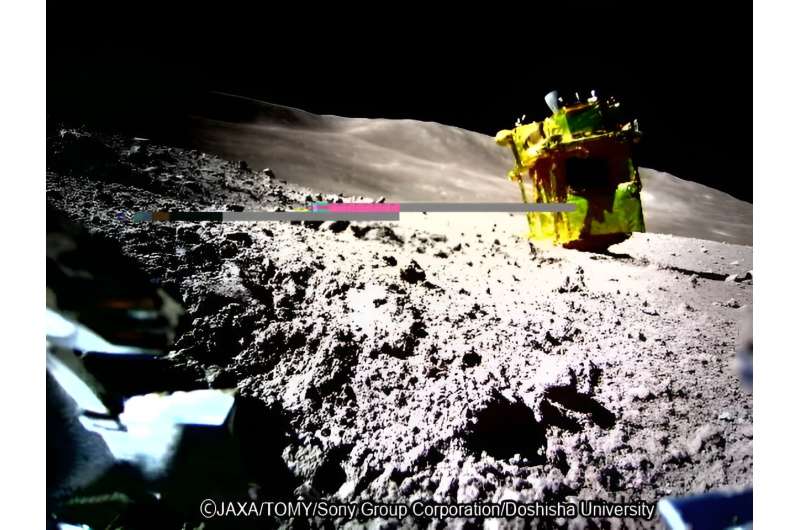
NASA's LRO (Lunar Reconnaissance Orbiter) has twice transmitted a laser pulse to a cookie-sized retroreflector aboard JAXA's (Japan Aerospace Exploration Agency) SLIM lander on the moon and received a return signal.
As LRO passed 44 miles above SLIM (Smart Lander for Investigating Moon) during two successive orbits on May 24, 2024, it pinged the lander with its laser altimeter instrument as it had done eight times before. But, on these two attempts, the signal bounced back to LRO's detector.
This was an important accomplishment for NASA because the device is not in an optimal position. Retroreflectors are typically secured to the top of landers, giving LRO a 120-degree range of angles to aim toward when sending laser pulses to the approximate location of a retroreflector.

